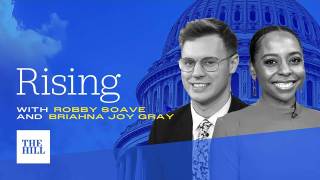Trump finds unlikely ally on 14th Amendment disqualification in Ketanji Brown Jackson
Justice Ketanji Brown Jackson emerged as an unlikely ally of former President Trump on Thursday when the Supreme Court heard arguments over an effort to block Trump from Colorado’s Republican primary ballot via the 14th Amendment’s Insurrection Clause.
Jackson, a liberal justice and the most junior on the high court’s bench, seemed sympathetic to one of the offramps that would keep the former president on the ballot, as proposed by some of Trump’s backers and hinted at by Trump’s own lawyer.
The Civil War-era provision was originally designed to prevent ex-Confederates from returning to power, and Jackson, the first Black woman to ascend to the nation’s highest court, suggested that the clause’s explicit language suggests the drafters were more worried about Southern states sending insurrectionists to Congress than one being elected president.
“Can you speak to the argument that really Section 3 was about preventing the South from rising again in the context of these sort of local elections, as opposed to focusing on the presidency,” Jackson asked.
Early on, Jackson sought to shift the courtroom debate to that point, and she later returned to it multiple times throughout the oral argument.
She focused on how the clause specifically disqualifies insurrectionists from being senators, House lawmakers and presidential or vice-presidential electors but not explicitly presidents or vice presidents.
The Colorado voters suing to kick Trump off the state’s ballot contend the ban applies because it includes a catchall category, reaching “any office, civil or military, under the United States,” which they argue includes the presidency.
“Why didn’t they put the word president in the very enumerated list in Section 3,” Jackson asked Jason Murray, the plaintiffs’ attorney. “The thing that really is troubling to me … they were listing people that were barred, and ‘president’ is not there.”
Jackson’s remarks came during a roughly two-hour argument that provided the first public glimpse of the Supreme Court’s thinking on the historic case, which could spark Trump’s removal from ballots in states across the country. A majority of justices signaled they are inclined to reverse the lower ruling disqualifying Trump in Colorado.
While questioning Trump’s lawyer, Jonathan Mitchell, Jackson homed in on the point — and implied she views the argument as a strong one.
“Do you agree that the framers would have put such a high and significant and important office sort of smuggled in through that catchall phrase?”
“We don’t agree at all,” Mitchell replied.
Jackson appeared puzzled, however, as to why Trump’s written briefs instead focused on another argument explaining why the 14th Amendment doesn’t apply to the presidency, with the justice questioning at one point whether Mitchell was walking away from the position in the brief.
Beyond the notion that Section 3 can’t disqualify someone from becoming president, Trump also contends he remains eligible to run because he never previously held a covered position. The provision only applies to people who engaged in insurrection after serving as an “officer of the United States.”
“We are arguing both, Your Honor,” Mitchell insisted.
“I don’t see that in your brief,” Jackson responded. “I see a lot of focus on the second, but not on the first.”
Trump’s arguments weren’t all met with Jackson’s apparent support. Her final question for Trump’s lawyer pointedly asked whether the Jan. 6, 2021, Capitol attack, in his view, was an insurrection.
“The Colorado Supreme Court concluded that the violent attempts of the petitioner’s supporters … qualified as an insurrection as defined by Section 3 … what is your position?” Jackson asked.
Mitchell responded that Trump “never accepted or conceded” in court filings that the riot was an insurrection, instead contending that Trump did not engage in any act that can “plausibly be characterized as an insurrection.”
Jackson jumped in to interject: “If the point is that a chaotic effort to overthrow the government is not an insurrection —”
“But we didn’t concede that it’s an effort to overthrow the government either, Justice Jackson,” Mitchell quickly rebutted.
“None of these criteria were met. This was a riot. It was not an insurrection. The events were shameful, criminal, violent, all of those things, but did not qualify as insurrection as that term is used in Section 3,” the Trump lawyer said.
Jackson’s questioning ended there.
A President Biden appointee, Jackson took her seat on the Supreme Court bench in June 2022 after a contentious nomination process marred by politics.
regular post copyright









